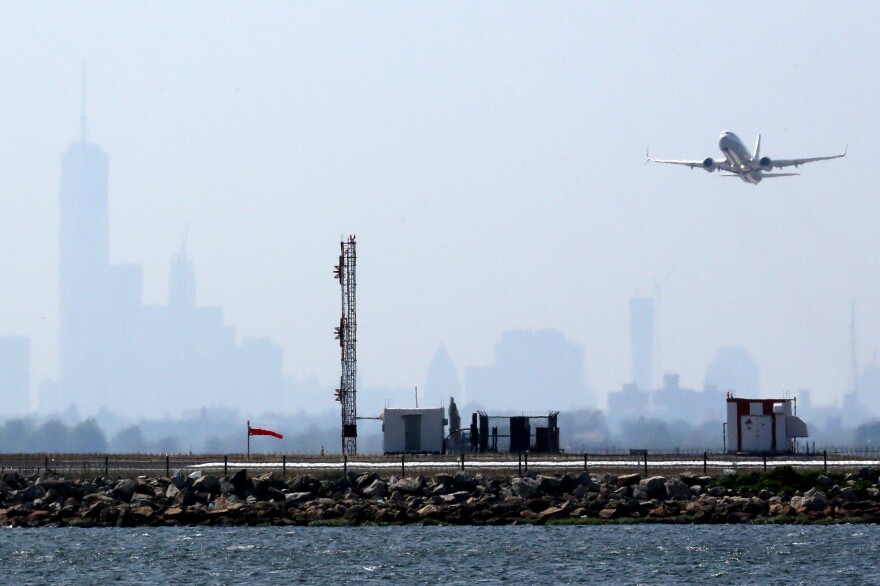You'd think everyone in the aviation industry would be on the same page about improving air travel. Surely they all want more modern aircraft and upgraded airports, right?
They do. But airlines and airports are in a political dogfight this summer over who should be getting more of your money for improvements.
Airports say they need higher airport fees to upgrade runways and terminals, many of which date back to the 1950s and 1960s. They want Congress to increase the $4.50-per-flight-segment fees, known as Passenger Facilities Charges, when it reauthorizes the Federal Aviation Administration. The existing authorization expires Sept. 30, so the debate will be in full swing this summer.
The airports' goal is to get that fee up to $8.50, with an index for inflation. The current fee "just isn't enough money," Brad Van Dam, a lobbyist for the American Association of Airport Executives, told reporters Monday at a National Press Foundation briefing.
But U.S. carriers are opposed to boosting a fee that might discourage travel.
"It takes a bit of chutzpah for our airport partners to advocate for a historic tax hike on the traveling public through a nearly 90 percent increase in the PFC airport tax," Sharon Pinkerton told a Senate committee in April. She is a lobbyist for Airlines for America, the trade group for major carriers.
"It simply isn't necessary," she testified. "Airports across our country are in a very strong financial position."
Pinkerton said increasing the PFC to $8 or higher would cost passengers more than $2.5 billion annually.
But Van Dam sees chutzpah on the other side of the debate: Since 2008, airlines have been tacking on more and more fees to replenish their coffers.
Van Dam pointed to how well the airlines are doing financially with their new fees. On Monday, the federal Bureau of Transportation Statistics said that in the first three months of this year, airlines made a collective profit of $3.1 billion — and took in $1.6 billion in fees, a first-quarter record. Those fees were imposed on passengers for checked bags and reservation changes.
The new fees have become the industry's salvation: Most carriers now largely count on flying to break even and on imposing fees to make profits. With fees generating billions in revenues each year, airlines have enjoyed eight straight quarters of net profits.
Todd Hauptli, who heads the airport executives group, issued a statement following the government's report on airline fees. "It's hard to reconcile the aggressive resistance of the airline industry to calls from airports for self-help to modernize their facilities while the carriers continue to rake in billions annually in fees from passengers," he said.
As the airlines and airports debate whether ticket fees need to go higher, the Government Accountability Office studied the question. In April, it concluded that in recent years, "traditional funding sources for airport development have generally declined." And it noted that, although the PFC has been capped at $4.50 since 2000, inflation has increased airport construction costs.
However, the GAO also pointed out that airports have improved their finances over the past decade by becoming more creative. For example, they have "identified new business ventures on airport property including the development of commercial retail, leisure activities, and medical facilities," it said.
As Congress decides the issue, a lot is on the line for travelers. Consider this scenario:
The PFC applies to each flight segment. So if your plane stops at a hub airport before continuing to your final destination, you may pay the PFC for two flights. At $8.50 per flight segment, that would come to $17 for your complete journey one way. That's $34 for a round trip.
Now multiply that PFC for a family of four (that's $34 times four) and you've just made it $136 more expensive to fly the family than if there were no PFC. (Currently, the PFC for those four people would total $72.)
And all of that comes before the airlines start piling on the baggage fees.
Given that gasoline prices are down and cars are more fuel efficient, this layering on of fees — for airport use, baggage, snacks, etc. — could push more people to drive.
But they may also drive if airlines don't upgrade their equipment, and airports don't expand to make flying safe and enjoyable.
The House Transportation and Infrastructure Committee is drafting FAA legislation and will take it up soon. Airports are hoping to include the PFC increase and airlines will be pushing to keep it out.
Copyright 2021 NPR. To see more, visit https://www.npr.org.



